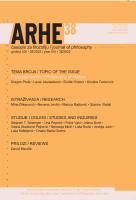Momčilo Selesković i rasprava o jeziku
Momčilo Selesković and the Dispute on Language
Author(s): Stanko VlaškiSubject(s): Political Philosophy, Philosophy of Language, Philosophy of Education
Published by: Филозофски факултет, Универзитет у Новом Саду
Keywords: Selesković; Philosophy of Language; Freedom; Culture; Symbol; Linguistic Politics; Kingdom of Yugoslavia;
Summary/Abstract: Lemmatic, often implicit, but sometimes also explicit adoption of the thesis that language should be developing naturally was a part of the question of creating united language politics in the Kingdom of Yugoslavia. Our paper is motivated by this question and focuses on the Momčilo Selesković's philosophy as one of our interwar thinkers who not only thematically approach the dispute on the origin and the development of language but recognizes the utmost philosophical dignity of this dispute. Reconsidering Selesković's philosophy of language in the light of Herder's, and Wilhelm von Humboldt's, as well as Aristotle's and Nietzsche's conception, the author tries to demonstrate that Selesković's thesis about the artificiality of language should not be interpreted simply as the acceptance of just one side within old dispute between adherents of the linguistic naturalism and the linguistic conventionalism. That thesis in his philosophy of language tends to encourage the reflection of the humanistic, libertarian essence of the language, and delegitimization of the conceptions which claim that language is something transcendent. Selesković is trying to show that by developing his doctrine of language as a set of symbols, as well as the specific critique of language insisting that it is uninventive. On the other hand, his considerations of different European nations' linguistic paradigm forming are related in the paper to the interwar Yugoslav linguistic perspectives more directly.
Journal: Arhe
- Issue Year: 2022
- Issue No: 38
- Page Range: 157-181
- Page Count: 25
- Language: Serbian

